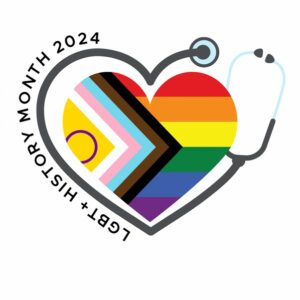The theme for LGBT+ History Month 2024 in the UK is ‘Medicine – #Under the Scope’ – designed to celebrate LGBT+ peoples’ contribution to medicine and healthcare, both now and in the past.
 Founded in 2004 by Schools OUT, LGBT+ History Month runs throughout February each year and aims to reclaim the past, celebrate the present and help to create a positive future for the LGBT+ community.
Founded in 2004 by Schools OUT, LGBT+ History Month runs throughout February each year and aims to reclaim the past, celebrate the present and help to create a positive future for the LGBT+ community.
This year’s theme has been selected in order to highlight the amazing work of LGBT+ staff across the NHS and all other healthcare settings in providing healthcare and support for people, especially during the recent Covid-19 pandemic and its aftermath.
The theme has a dual purpose, however, and is also designed to shine a spotlight on the history of the LGBT+ community’s experience of receiving healthcare, which has often been very complicated, and the health inequalities still experienced by LGBT+ people today.
The awareness campaign comes at a time when the LGBT+ community is experiencing “a rise in hate crime and hate instances.”
Schools OUT encourages people to listen to the lived experiences of LGBT+ people and to include LGBT+ people in their LGBT+ History Month events “in all our diversity.”
LGBT+ History Month is for everyone
 The campaign was founded to help share the previously untold – and hidden – history of LGBT+ people. It is designed for everyone, including those working in all sectors and business types, schools, community groups and individuals.
The campaign was founded to help share the previously untold – and hidden – history of LGBT+ people. It is designed for everyone, including those working in all sectors and business types, schools, community groups and individuals.
Schools OUT has developed a special logo for this year’s healthcare theme and provides a range of free resources for education settings, businesses, services and organisations each year to help them celebrate LGBT+ History Month and to, as they term it, “‘Usualise’ LGBT+ lives in their full diversity.”
LGBT+ History Month is a celebration and special events are usually held throughout February and across the UK and shared on the dedicated website.
People can show their support for LGBT+ History Month by buying the 2024 badge or lanyard and by positively joining in the conversation on social media using the hashtags #LGBTplusHM and #UnderTheScope.
LGBT+ people have “disproportionately worse” healthcare experiences
Dr Michael Brady, National LGBT Health Advisor at NHS England, acknowledges the significant health inequalities still experienced by LGBT+ individuals. He explains:
“The evidence that LGBT+ people have disproportionately worse health outcomes and experiences of healthcare is both compelling and consistent. With almost every measure we look at, LGBT+ communities fare worse than others. This is unacceptable, and we need to increase our efforts to address these health inequalities.”
Dr Brady references the 2017 National LGBT survey, which garnered over 108,000 responses and revealed that LGBT+ communities faced discrimination in healthcare, felt their specific needs were not met, had poorer experiences when accessing care or had major concerns about accessing healthcare.
The key findings included:
- At least 16% of survey respondents had a negative experience when accessing public health services because of their sexual orientation
- Around 4 in 10 (38%) respondents had a negative experience when accessing public health services because of their gender identity
- 51% of respondents who had tried to access mental health services had been made to wait too long, 27% were worried, anxious or embarrassed about going and 16% said their GP was not supportive
- 80% of trans respondents who accessed or tried to access gender identity clinics said it was not easy and that long waiting times were a significant barrier
In July 2018, the Government Equalities Office launched the national LGBT+ Action Plan to tackle the issues highlighted by the survey and advance the rights of LGBT+ people both at home and abroad.
The LGBT+ health priorities for NHS England and NHS Improvement include:
- Advice and influencing – they will work across programmes and with external partners to reduce LGBT+ health inequalities and improve access to and experiences of healthcare
- Sexual orientation, inclusive gender and trans status monitoring – this must be scaled up and rolled out across health and social care services, with a standard developed for inclusive gender and trans status monitoring to improve data on LGBT+ groups and improve the care provided
- Evidence base – they will develop the evidence base for LGBT+ health inequalities and use this to inform policy change across healthcare
- Education and training – they will develop and share best practice education and training to improve healthcare professionals’ awareness and understanding of LGBT+ communities, across all professions, to improve experiences for LGBT+ patients
LGBT+ History Month supports LGBT+ equality in the workplace
LGBT+ History Month is celebrated across the NHS each year, with the campaign also giving NHS Trusts “the opportunity to demonstrate how they are taking action to support LGBT+ equality in the workplace.”
NHS Employers says:
“The NHS People Plan recognises the urgency of NHS leaders acting and creating an organisational culture where everyone feels that they belong – in particular, improving the experience of staff from diverse and minority backgrounds.”
There are resources available to support leaders in healthcare, such as the Health and Care LGBTQ+ Leaders Network. They provide a range of free resources to help improve the experiences of LGBTQ+ staff, including the LGBTQ+ Inclusion Framework. The British Medical Association (BMA) also offers a range of resources which explore the experiences of LGBTQ+ doctors and medical students in education, training and the workplace.
Supporting LGBT+ people in later life
 In relation to improving the experiences of LGBTQ+ people when they access care and support, Skills for Care co-developed the LGBTQ+ Learning Framework in 2023.
In relation to improving the experiences of LGBTQ+ people when they access care and support, Skills for Care co-developed the LGBTQ+ Learning Framework in 2023.
The framework focuses on developing the knowledge, skills and values of care workers to enable them to “work affirmatively, inclusively and effectively” with older people who are lesbian, gay, bisexual, trans or queer (LGBTQ+).
It can be used by social care employers, employees, training providers, regulators, commissioners, policy makers and others.
Created in collaboration with the University of Strathclyde, the Pride in Ageing programme at the LGBT Foundation and older people from within the LGBTQ+ community, the comprehensive framework was published during last year’s LGBT+ History Month. It provides care workers with a background understanding of key LGBTQ+ issues and awareness and also includes information on:
- Health and wellbeing issues later in life
- Research about LGBTQ+ inequalities
- Provision of personalised care and support, including trans-affirmative care
- Intersectionality
- Supporting people with dementia or HIV
- Intimacy and sexuality later in life
Celebrate LGBT+ History Month with training
 First Response Training (FRT) is a leading, national training provider. They deliver over 7,000 courses each year in the fields of health and safety, first aid, fire safety, food safety, mental health, health and social care and other special focus topics.
First Response Training (FRT) is a leading, national training provider. They deliver over 7,000 courses each year in the fields of health and safety, first aid, fire safety, food safety, mental health, health and social care and other special focus topics.
Their diverse portfolio includes training awards designed for health and social care organisations, such as Infection Control and Prevention, Safeguarding Adults, Duty of Care, Equality, Diversity and Inclusion, Person Centred Care and Support and many others.
Their course portfolio spans Care Certificate standards, Level 2 and Level 3 Awards and training for supervisors and managers.
A trainer from FRT says:
“It’s important that workers in health and social care have the right skills, knowledge and values to provide safe, person-centred, compassionate and dignified care to all individuals who need their support. This, of course, includes people from LGBTQ+ communities.
“It’s also important that care organisations and settings are actively promoting and supporting equality, diversity and inclusion and ensuring that their workforce has the right skills to provide truly inclusive care.
“We wholeheartedly support and celebrate LGBT+ History Month and this year’s focus on healthcare and medicine, and the amazing contributions of LGBT+ individuals in these fields.”
For more information on the training provided by FRT, please call them on freephone 0800 310 2300 or send an e-mail to info@firstresponsetraining.com.
